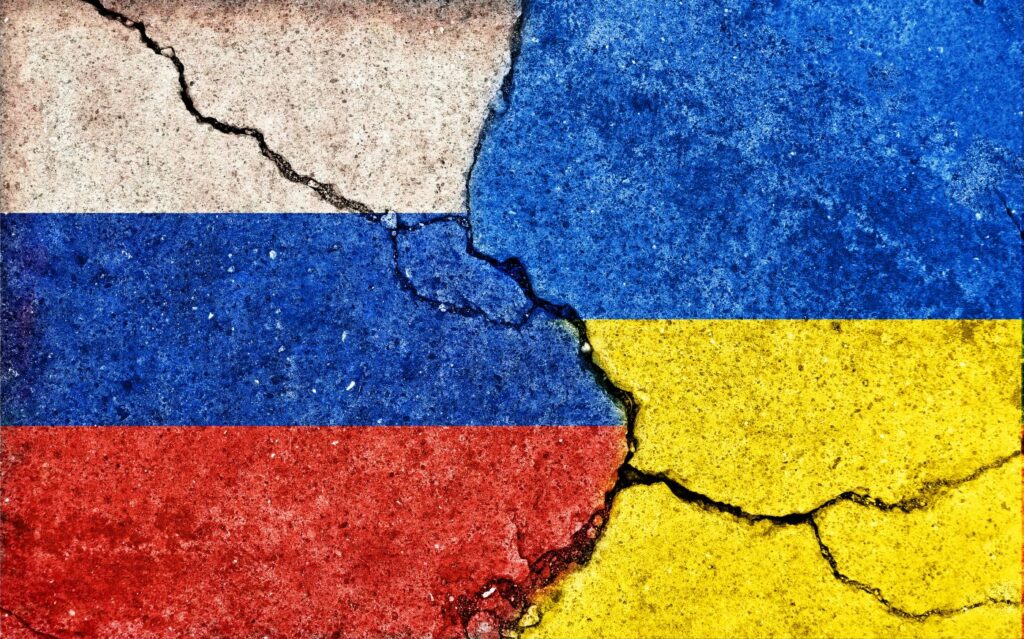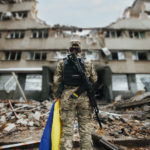Any occasion of serious and thoughtful debate or conversation on the ethics of war and peace is to be applauded, especially in our day, given the cultural climate. In such debate, positions are often distorted, and people representing those positions are not infrequently falsely stereotyped. I am grateful for Professor Carson Holloway’s thoughtful response to my piece on our moral obligation to aid war-torn Ukraine, which thankfully avoids those tendencies.
There is much in my argument with which Holloway agrees, as he frequently reminds the reader. What he views as problematic is the manner in which I make application of the principles set forth in the article: a “Good Samaritan” or “Golden Rule” ethic, the wedding of justice and charity (neighbor-love), and a willingness to help the oppressed and deeply afflicted.
At the outset of my response, permit me to confess that my argument is indeed “one-sided,” against which Holloway chafes. And I do acknowledge that well-meaning and informed people will disagree with my position. At the same time, often absent is a moral seriousness and a commitment to do what is right among those who question allied—and U.S.—involvement in defending against Russia’s unjust war in Ukraine, a war that is horrifying and wholly unjust by any and all just-war moral measurement. Holloway is justified in raising the question of war’s “escalation,” and yet this fear, so typical of those in the West, plays into the hand of tyrants and despots, as it has for the last two and a half years in Ukraine. The West—including the U.S.—presently suffers from moral confusion and weakness, as multiple global scenarios make quite clear. For this reason, Ukraine is pivotal, as I argue, for both moral and political reasons.
Nowhere does Holloway mention the importance of holding Russia accountable for its aggression—accountable by compensating for untold damage, loss of life and injury (with a total count of dead or wounded hovering at near one million), and the uprooting of a third (think of it: a third!) of Ukraine’s population. Accountable for the destruction of Ukraine’s civil infrastructure, for war crimes, for the deportation of tens of thousands of children for “reeducation,” and for crimes that violate international law and wreak havoc in the global order. And accountable, according to one estimate, for at least 100 airstrikes on Ukrainian territory every day, against which Ukraine, with the help of its allies, has every right to defend itself to the fullest. Nowhere does Holloway acknowledge the necessity of a just peace (without which only further evil will follow), whereby Ukraine’s sovereignty, independence, and territorial integrity are restored in accordance with international law. Ukrainians are under no illusions regarding Russia’s intentions, and neither are the Baltic states and Poland. There is, of course, a negotiated “peace” that is fundamentally unjust; without a just peace as our aim, we invite—we guarantee—global chaos. Would the U.S. think differently if a rogue superpower invaded Costa Rica, Colombia, or Canada? And what to do about North Korean and Iranian missiles and drones presently being supplied to Russian forces? International law and accountability appear to be nonexistent. What principled and free nation or coalition of nations will oppose this outrage?
Start your day with Public Discourse
Sign up and get our daily essays sent straight to your inbox.Holloway considers insignificant the 1994 Budapest Memorandum, by which four signatories promised to “respect the independence and sovereignty and existing borders” of Ukraine. Further, the U.S. as one of those four signatories promised to respond in the event that Russia violated the agreement. Holloway chastises me for asking, “Should we hold to our word?” With Russia’s occupation of Crimea and the invasion of eastern Ukraine via proxy forces, the year 2014 revealed the weak commitment of the West in general and of the U.S. in particular. Additionally, one can draw a clear line between Putin’s decision formally to invade Ukraine in 2022 and the U.S.’s shameful withdrawal from Afghanistan. And even with the onset of Russia’s full-scale invasion two and a half years ago, U.S. support was diluted; only after Ukraine’s stubborn resistance to Russian attacks over time did the U.S. and its allies contribute substantial military support.
Holloway argues that Charles “errs in his application” of the moral principles being cited in the article. Holloway is willing to acknowledge that, yes, the “Good Samaritan” ethic takes risks by entering a “dangerous situation,” but the problem, he insists, is “more complex” when it applies to a nation intervening in a violent conflict. Holloway makes a firm—and legitimate, we can grant—distinction between the costs of personal intervention and those of a nation governed by public officials.
Here Holloway acknowledges that charity underpins just war moral reasoning, per Thomas Aquinas. And he acknowledges that the “Good Samaritan”/“Golden Rule” ethic, charity, and just war moral reasoning are “relevant” to war and diplomacy. But even when he recognizes that the U.S. cannot absolve itself from the present war, Holloway questions helping a nation “on the other side of the world.” And strangely, Holloway denies that the U.S. is an “ally” of Ukraine; we are not, he says flatly. This is striking news to many of us—whether lawmakers, diplomats, or ordinary citizens—given several notable factors: 1) our promise in 1994 through the Budapest Memorandum to help defend Ukraine’s sovereignty and territorial integrity (an accent that Holloway disavows); 2) our support since the war’s beginning (notwithstanding the West’s shameful passivity in 2014, which emboldened the Russian dictator to formally invade in 2022); and 3) the recent bilateral security agreement between the U.S. and Ukraine signed during the G7 summit.
Holloway believes my argument to be “superficial and one-sided,” not part of the moral wisdom needed for diplomacy and discernment before deciding to enter conflict. He rejects my “partisan” approach and failure to ask, “What about the Russian people?” And he writes as if there were no clearly acknowledged, morally confirmed, and internationally recognized need for justice in responding to Russian aggression; but, in truth, there is. Relatedly, exactly why a “Russian–Mexican alliance,” which Holloway uses for illustration, would warrant resisting, based on security, is not made clear.
Strangely, despite his misgivings about American involvement in the war, Holloway acknowledges that “[i]t would certainly be just to wage war in defense of Ukraine against unprovoked Russian aggression.” But why and on what grounds? He does not say. And he resists the possibility that the “superficial” and “one-sided” application of “Good Samaritan”/“Golden Rule” ethics and just war moral reasoning can indeed inform our involvement in Ukraine.
Holloway declares that “Charles does not take seriously the possibility that the war . . . would do more harm than good.” But this mistaken conclusion seems to be a misreading and distortion of the just-war condition of “proportionality.” It is true that we consider the costs and ramifications of intervening. But we must not place potential—or imagined—risk ahead of present, ongoing costs and atrocities and the real threat (i.e., just cause). The fear of “escalation,” for some, would appear greater than our commitment to do what is just and charitable (“loving your neighbor as yourself”). Holloway is unable to ask the discomfiting question, “What if Russian imperialist designs, outrageous evil being imposed on an independent, sovereign (and innocent) neighbor-state, and innumerable crimes against humanity are not deterred?” What are the ramifications if the Russian dictator is not inhibited? We then only make the world safe for criminals. (Some aspects of our present state of geopolitical affairs are reminiscent of 1938–39; in the face of the totalitarian threat, appeasement was the air that we breathed, as confirmed by the disastrous Munich agreement inter alia. Would the allies have entered World War II on the basis of a “reasonable chance of success”? Hardly. As theologian John Courtney Murray observed, there are some human values needing defending that cannot be quantified.) The answer to the above question is clear: we guarantee thereby a greater—global—catastrophe; other totalitarian/rogue regimes are watching and taking notes.
With other free nations, in coalition, we have the moral and political responsibility of helping to deter sociopolitical evil. Not everywhere, but where we can for strategic purposes. Since the supposed end of the Cold War, this is a task that has been denied. Meanwhile, the Cold War merely went underground, only to emerge with frightening potential.
Yes, I acknowledge that my position is partial and “lopsided,” as Holloway avers. And I wish to err on the side of assisting the helpless, the relatively defenseless, and those who have been—and are being—attacked unjustly. Unfortunately, Holloway can offer us nothing of a practical nature that might help the oppressed and beleaguered people of Ukraine who have been victimized by an unjust war—that is, other than a caution against “escalation,” which is to say, Putin’s escalation. Meanwhile, a nation disappears. So much for justice and charity. Yes, the future of the world is being decided in Ukraine.
Love your neighbor as yourself—contra Holloway, the “Golden Rule” ethic makes for morally serious, honorable, and practical foreign policy considerations. What it needs, however, is an actor or agent—a willing agent—who has the moral backbone to respond. As with individuals, so it is with nations: to whom much has been given, much will be required.
Just war proponent Paul Ramsey, a generation removed, noted in his writings the relevance of the “Good Samaritan” ethic for just-war policy considerations. He extended the parable of Luke 10 to ask, ”Would it have been a ‘good Samaritan’ to forcefully prevent the mugging and attempted murder of the victim as it was happening?” Ramsey further asked, “Would it have been a ‘good Samaritan’ to participate in a ‘police force’ that patrolled or guarded the notoriously dangerous Jericho Road?” Ramsey’s answer to both questions was yes.
And I concur.
Image by barks and licensed via Adobe Stock.














